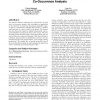Free Online Productivity Tools
i2Speak
i2Symbol
i2OCR
iTex2Img
iWeb2Print
iWeb2Shot
i2Type
iPdf2Split
iPdf2Merge
i2Bopomofo
i2Arabic
i2Style
i2Image
i2PDF
iLatex2Rtf
Sci2ools
CIKM
2010
Springer
2010
Springer
Discovery of numerous specific topics via term co-occurrence analysis
We describe efficient techniques for construction of large term co-occurrence graphs, and investigate an application to the discovery of numerous fine-grained (specific) topics. A topic is a small dense subgraph discovered by a random walk initiated at a term (node) in the graph. We observe that the discovered topics are highly interpretable, and reveal the different meanings of terms in the corpus. We show the information-theoretic utility of the topics when they are used as features in supervised learning. Such features lead to consistent improvements in classification accuracy over the standard bag-of-words representation, even at high training proportions. We explain how a layered pyramidal view of the term distribution helps in understanding the algorithms and in visualizing and interpreting the topics. Categories and Subject Descriptors H.3.3 [Information Systems]: Information Search and Retrieval--Clustering General Terms Algorithms Keywords unsupervised learning, text mining, ...
CIKM 2010 | Information Technology | Large Term Co-occurrence | Layered Pyramidal View | Small Dense Subgraph |
| Added | 10 Feb 2011 |
| Updated | 10 Feb 2011 |
| Type | Journal |
| Year | 2010 |
| Where | CIKM |
| Authors | Omid Madani, Jiye Yu |
Comments (0)

